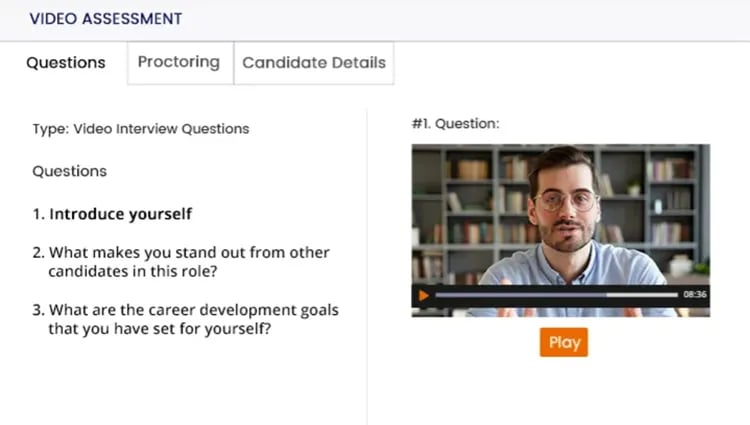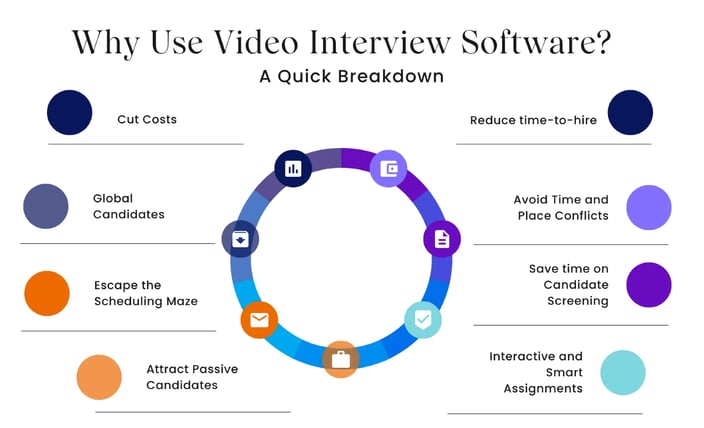Video interviews are expected to continue to be a popular tool for remote recruitment in 2025. As the COVID-19 pandemic has accelerated the trend toward remote work, more companies are adopting video interviews as a way to assess candidates who are not able to travel to the office for an in-person interview.
But while the COVID-19 may be a thing of the past and everyone is returning to pre-COVID, talent acquisition leaders prefer the new normal of virtual hiring. That’s because companies recognize that they can reduce their time to hire by up to 70% if they use video interviewing when hiring, and they can save significantly on efforts and costs.
Example: A video interviewing platform like iMocha helped minimize hiring time by 70% for companies like Hexaware, Deloitte, TCS, and more.
Do Candidates Prefer Video Interviewing?
The short answer is yes.
A recent study by Software Advice shows that nearly half of the respondents with prior video interview experience prefer video interviews to other long-distance interview formats, and we are talking a whopping 92%!
Key Takeaways:
- 49% of candidates say a video interview helps them to stand out in the hiring process. (Source: Lighthouse)
- 61% of companies said video interviews and interactions would be the best way to attract top talent with video hiring solutions.
- 92% of candidates like video interviews because these interviews are flexible, convenient, and innovative.
This proves finding the right video interview software for your organization is vital.
A video interview tool like iMocha offers features that will enhance and improve your recruitment process. Its candidate video interview feature enables you to construct well-organized and structured interviews that are objective and fair.
|
Want to reduce slow and tedious candidate screenings? iMocha's video interview software will reduce interview time by 70%. |
Types of video interviews and the roles they play in the hiring process
It isn’t just about switching on video and interviewing – today's video interview tools can do a lot more than that! They help you assess coding live, candidates’ behavioural skills, and a lot more.
1. One-way video interviews
Asynchronous interviews or one-way interviews are a better alternative to traditional phone screenings and offer convenience to both recruiters and candidates, particularly when dealing with different time zones.
With one-way video interview, recruiters can provide questions in text or video format, allowing candidates to record their responses at their convenience. After submission, the recruiter can review and assess the responses later. This method of interviewing is also known as on demand video interviews and is useful in providing recruiters with an accurate representation of a candidate during the initial stages of the hiring process.
If you wish to know more about the benefits of video interviewing for candidates, visit here: Benefits of One-Way Video Interview.
Here’s what a one-way video interview looks like:

2. Two-way video interviews
Two-way or live video interviewing allows candidates and interviewers to live stream. Such interviews are remote while talking to each other in real time.
Live video interviews are highly effective for overcoming challenges like hiring costs, biases, distance, and situations when physical interviews might not be possible. It is similar to an in-person interview. Here too, you can go back and forth with a candidate to properly evaluate their skills and abilities so that you can hire the best talents.
Even the world's leading organizations like LinkedIn, Google, and Amazon are interviewing candidates virtually via video interviewing tools.
Be assured that live video and one-way recruitment interviews don't mean conducting interviews via Zoom or Skype. Both these types of interviews are carried out via dedicated video interview software. This software offers various functionalities built-in to streamline the recruitment process. For example, interview scheduling, whiteboard collaborating, ATS integration, interview recording, and proctoring are some features that help drive efficiencies for recruiters.
Here’s how you can transition to a fully remote recruiting process with these Video Interview Software and Platforms for Virtual Interviews in 2025
|
Technical assessments? Check! One-way video interviews? Check! Live Coding Interview? Check! Whiteboard assessments? Check! Custom assessments for your open job roles? Check! iMocha offers all! |
Five main reasons why candidates and recruiters prefer video interviewing
1. Cost and Time Saving
Physical or short-notice interviews with candidates can often lead to cancelled and rescheduled appointments, making it a tedious task for recruiters. Video interviews have become popular because they save time and money for both recruiters and candidates.
Video interviews allow recruiters to schedule and hold multiple meetings, fitting as many interviews into their schedule with minimal wait time. Candidates can answer the interview from anywhere, on any device, and at any time, even while on the go.
Video interviews enable recruiters to interview more candidates and spend less time on the most time-consuming phases of the recruiting funnel. This means that they will be equipped with more and better-quality information earlier in the recruiting process, saving time in the next steps.
Online video interviews also allow stakeholders and hiring teams to sit in on the interview, make collaborative decisions, and accelerate the entire hiring process.
2. Diverse Talent Pools
According to a LinkedIn survey, one of the biggest priorities for talent teams right now is hiring people from varied backgrounds.
Online video interviewing can quickly achieve those goals if your company's plan includes diversifying the team with new talents.
Wondering how?
By offering remote video interviews, you are opening up positions to a much wider talent pool — candidates will appreciate that. Video interviews make it possible to connect virtually with candidates you might not otherwise get to meet in person.
By interviewing candidates outside your city, state, or country, you will still be able to attract a diverse pool of candidates for any role.
3. Improves interview attendance rates
Video interviews can improve interview attendance rates in several ways:
- Convenience: Video interviews provide more flexibility to candidates, who can participate in the interview from any location, at any time, and using any device. This reduces the need for candidates to take time off work or travel to a physical location, making it easier for them to attend the interview.
- Time Savings: With video interviews, candidates don't have to spend time commuting or waiting for their turn, reducing the time commitment required for the interview. This makes it more likely that candidates will attend the interview.
- Reduced Scheduling Conflicts: Video interviews also reduce scheduling conflicts that can occur when trying to set up a physical interview. Candidates may have other commitments or work schedules that make it difficult to attend an in-person interview. With video interviews, candidates can select a time that is most convenient for them, making it more likely that they will attend.
Are video interviews the future of recruitment? Overall, video interviews offer a convenient and flexible alternative to traditional in-person interviews, which can help improve attendance rates and ensure that the best candidates are considered for the job.
|
Want to reduce no-show rates? iMocha's automated interview scheduling tool allows candidates to choose an interview time that fits their schedule. |
4. Demonstrating your company's Innovation
Screening job candidates and conducting employment interviews via candidate video interviews reflect well on a company. In today's competitive world, showing candidates that your company is innovative and forward-thinking is essential. As a result, hiring managers can expect to attract creative and quality candidates.
In addition, using the latest technology shows that your company is innovative and that you are committed to improving the recruiting process. This will give candidates a positive impression of your company and help boost the employment brand.
For a recruiter, making use of recording job interviews will help you to identify the right-fit candidates for your organization. As you receive additional information on your candidates through their video answers, you're more likely to hire the right person.
5. Improves candidate experience
Interviews can be an overwhelmingly stressful experience. Companies know it. Candidates know it.
Research by Lighthouse said candidates preferred video interviews to in-person interviews by nearly 25%. (Source: Lighthouse)
By looking at the data, it becomes apparent—that candidates find video interviews valuable to help them stand out in the hiring process. They even preferred candidate video interviews over resumes and assessments.
A candidate video interview offers a foundation to show their skills and personality traits. It is exciting, easy, and convenient for candidates and hiring teams.
The key to creating a good candidate experience with video interviews is to use a platform that lets you connect with candidates and evaluate crucial skills before the final interview. A platform like iMocha will help enhance the candidate and reduce interview time by 70%.
Read on to learn more about benefits of using video interview platform to your hiring process.
Some influential tips for hiring managers to make on demand video interviews easier for candidates:
1. If you are using a platform for recording job interviews like iMocha, keep in mind that the candidate may need to become more familiar with your platform.
Hence you need to provide candidates with clear directions on the equipment they'll need to join the interview. You can communicate these expectations as you would for an on-site interview so candidates are well-prepared and comfortable.
Explore how to add iMocha’s video interview questions and use them in the tests.
2. Allow candidates enough time to answer each question without rushing. You can provide them with a limited number of questions and be mindful of the length of response each requires. Additionally, you can inform them about the time they'll have before they start.
3. Have a recruiter record themselves asking the questions. This helps add a layer of personality and avoids being one-sided.
4. Allow candidates to review and record themselves several times before submitting a question. Tell them this upfront, so they feel relaxed if they make a mistake.
|
Get the best talent for your niche role. Use iMocha's custom assessments and find your perfect match. |

